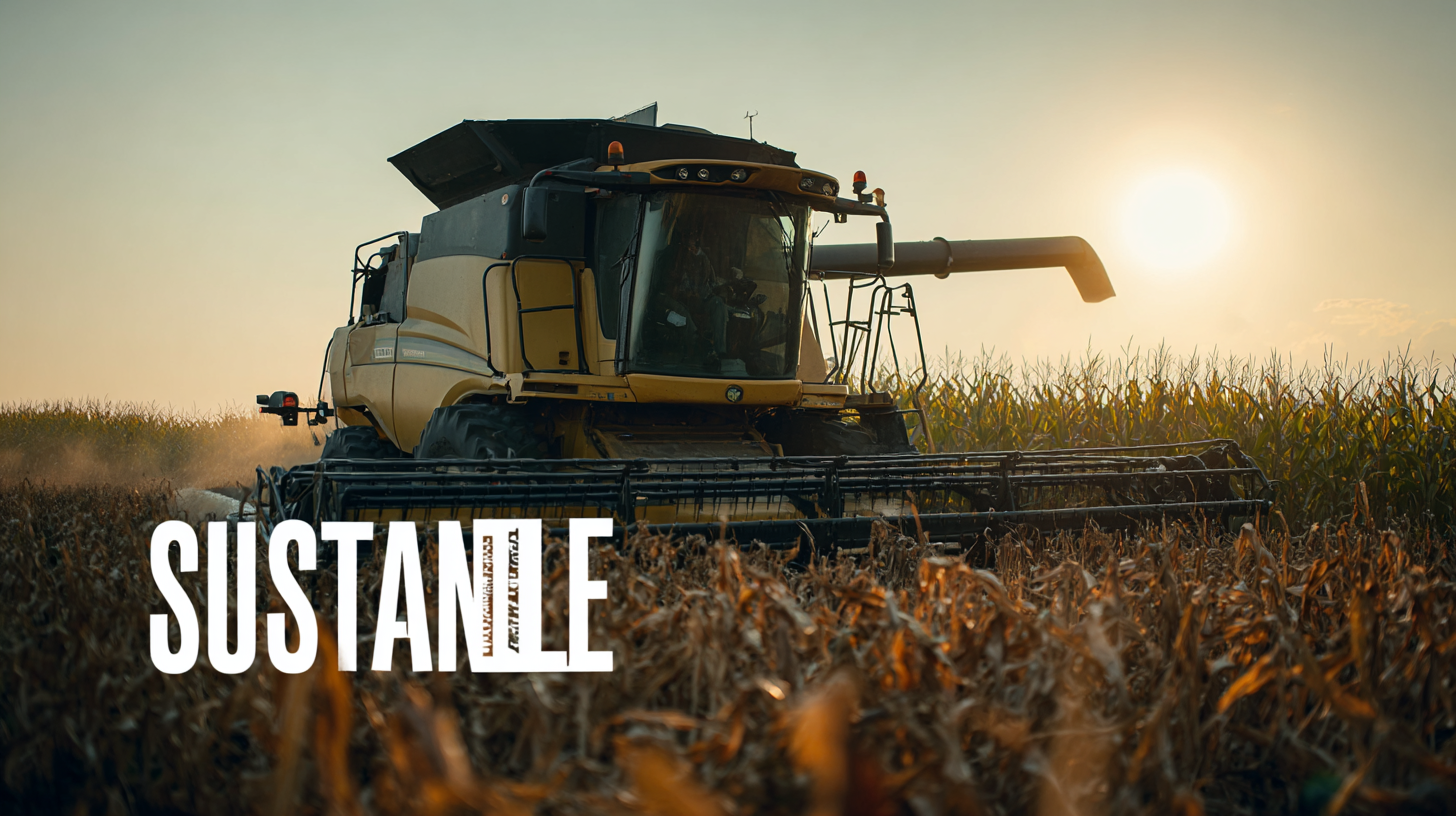As we look towards 2025, the agricultural sector is poised for transformative change driven by advancements in farm equipment that prioritize sustainability. According to a recent market analysis, the global farm equipment market is projected to reach $260 billion by 2025, with a significant shift towards technology-integrated solutions that reduce environmental impact. Innovations such as precision farming tools and eco-friendly machinery not only enhance productivity but also align with the increasing demand for sustainable practices in agriculture. The integration of IoT and AI technologies into farm equipment is expected to revolutionize farming operations, making them more efficient and resource-conscious. As the industry adapts to these trends, the focus on sustainable farm equipment will be critical in addressing food security and environmental challenges in the coming years.

The rise of smart farming is revolutionizing the agricultural landscape, paving the way for sustainable practices that significantly boost productivity while minimizing environmental impact. According to a report by MarketsandMarkets, the global smart agriculture market is projected to reach $22 billion by 2025, growing at a CAGR of 13.6%. This surge in adoption reflects the increasing recognition of technology’s role in enhancing efficiency and sustainability in farming operations.
Innovations such as precision agriculture, IoT-enabled sensors, and artificial intelligence are at the forefront of this transformation. For instance, the use of drones and remote sensing helps farmers monitor crop health in real-time, leading to more informed decision-making. A study published by the Journal of Agricultural Science found that implementing precision farming techniques can reduce input costs by up to 20% while increasing yields by approximately 15%. These advancements enable growers to utilize resources more efficiently, ultimately contributing to a more sustainable agricultural system capable of supporting a growing global population.
| Technology | Description | Benefits | Sustainability Impact |
|---|---|---|---|
| Precision Agriculture | Utilizes GPS and IoT to monitor field variability | Increased yield and reduced resource usage | Promotes efficient use of water and fertilizers |
| Drones | Aerial imaging for crop monitoring and analysis | Time-saving with accurate data collection | Supports targeted interventions to minimize waste |
| Automated Tractors | Self-driving tractors for planting and harvesting | Reduces labor costs and enhances efficiency | Minimizes soil compaction and fuel consumption |
| Soil Sensors | Sensors for real-time soil health and moisture levels | Optimizes irrigation and nutrient application | Promotes soil health and biodiversity |
| Vertical Farming Systems | Innovative farming method utilizing stacked layers | Maximizes space and reduces the need for pesticides | Conserves land and reduces carbon footprint |
 In the rapidly evolving agricultural landscape, the focus on sustainable practices is compelling farmers to seek innovative, eco-friendly equipment. Modern farmers recognize that adopting sustainable agricultural equipment not only benefits the environment but also enhances productivity and efficiency. Essential features of this equipment include energy-efficient technologies, biodegradable materials, and smart sensor integration, which collectively contribute to reduced carbon footprints and minimized waste. Innovations such as precision farming tools and advanced irrigation systems enable farmers to optimize resource usage while maintaining high crop yields.
In the rapidly evolving agricultural landscape, the focus on sustainable practices is compelling farmers to seek innovative, eco-friendly equipment. Modern farmers recognize that adopting sustainable agricultural equipment not only benefits the environment but also enhances productivity and efficiency. Essential features of this equipment include energy-efficient technologies, biodegradable materials, and smart sensor integration, which collectively contribute to reduced carbon footprints and minimized waste. Innovations such as precision farming tools and advanced irrigation systems enable farmers to optimize resource usage while maintaining high crop yields.
The growing market for sustainable agriculture reflects an increasing demand for products that prioritize ecological balance. As the global sustainable agriculture market is projected to reach significant valuations by 2024, manufacturers are responding with cutting-edge solutions designed to meet the needs of environmentally conscious farming. Smart technologies, like AI-powered analytics and data-driven applications, are transforming traditional farming methods. By harnessing these advancements, farmers can make informed decisions that enhance both productivity and sustainability, ultimately shaping a more responsible agricultural future.
The agricultural sector is undergoing a revolutionary transformation as innovations in farm machinery pave the way for more sustainable practices. From precision planting technology to advanced GPS-guided tractors, modern equipment is not only more efficient but also significantly reduces environmental footprints. These innovations allow farmers to apply fertilizers and pesticides with pinpoint accuracy, minimizing waste and preventing runoff into water systems. This precision farming approach contributes to healthier soils and promotes biodiversity, making agriculture more sustainable for future generations.
Another critical development in farm equipment is the rise of energy-efficient machinery. Electric tractors and solar-powered tools are becoming increasingly common, providing eco-friendly alternatives to traditional fuel-powered equipment. These innovations help in reducing greenhouse gas emissions and reliance on fossil fuels, aligning agricultural practices with global sustainability goals. By investing in such technology, farmers are not only cutting operational costs but also playing an essential role in combating climate change and preserving our planet's resources. The future of agriculture looks promising as these advancements enhance productivity while ensuring the health of the environment.
This chart illustrates the impact score of various innovations in farm equipment that contribute to sustainable agriculture. These innovations, rated on a scale from 1 to 10, highlight the significant benefits that precision agriculture and solar-powered equipment bring to sustainable farming practices.
In the realm of sustainable agriculture, the quest for cost-effective solutions has never been more crucial. Farmers today face the dual challenge of maximizing output while minimizing environmental impact. Innovative farm equipment plays a pivotal role in this balance, incorporating advanced technologies that reduce costs and enhance efficiency. For instance, precision agriculture tools, such as drones and soil sensors, enable farmers to monitor their fields in real-time, ensuring that resources like water and fertilizer are used judiciously. This not only cuts down on waste but also significantly lowers operational costs in the long run.

Investing in sustainable farming equipment is an investment in the future of our planet. Equipment designed for renewable energy usage, such as solar-powered tractors, reduces dependency on fossil fuels, thereby decreasing the carbon footprint of farming operations. Moreover, tools that facilitate regenerative practices, like no-till planters and cover crop planters, help maintain soil health and biodiversity. By adopting these technologies, farmers not only enhance their productivity but also position themselves as stewards of the environment.
Embracing these innovative solutions today paves the way for a sustainable tomorrow in agriculture.
Farmers across the globe are increasingly embracing innovative equipment that significantly enhances their productivity and sustainability. A recent report by AgFunder found that precision agriculture technologies have grown in investment to over $1 billion in the last year alone, highlighting a shift towards smarter farming solutions. These advancements not only help in reducing input costs but also contribute to environmental conservation. For example, the use of automated tractors equipped with GPS technology can optimize planting patterns, resulting in a 20% reduction in seed waste, which is crucial for sustainable practices.
One notable success story comes from a cooperative of farmers in the Midwest who adopted drone technology for crop monitoring and health analysis. By implementing this innovative equipment, they have experienced an impressive 30% increase in crop yield while significantly cutting down on pesticide use. According to a recent survey by the Association of Equipment Manufacturers, 75% of farmers reported that adopting new technologies has positively impacted their operational efficiency. These farmers are not only thriving financially but are also setting new standards for environmental stewardship in agriculture, proving that innovative equipment choices can lead to both economic success and ecological benefits.